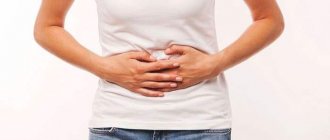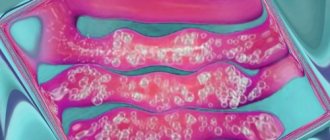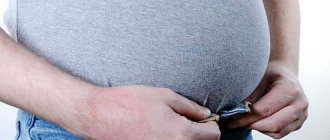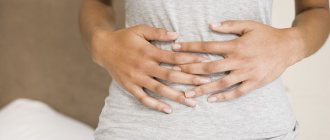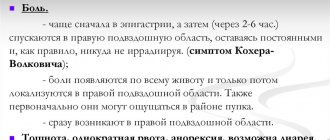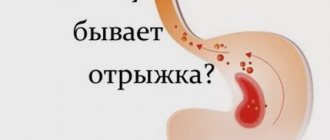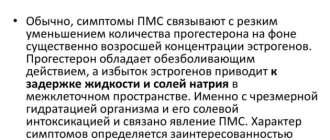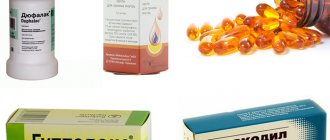Why does bloating occur?
The causes of flatulence can be varied, from poor nutrition to disruption of the digestive tract. You can determine the problem either independently (for example, by trying to change your diet), or with the help of a doctor and diagnostic measures. The most common causes of bloating are:
- simple swallowing of air while eating (in this case, bloating occurs rarely and is not periodic);
- the habit of eating on the go or talking while eating;
- drinking in large sips;
- smoking while eating;
- unbalanced diet;
- frequent use of chewing gum;
- abuse of carbonated drinks, especially sweet ones;
- treatment of heartburn by drinking soda (it affects the environment inside the stomach, transforming it from acidic to neutral, which provokes increased gas formation);
- any diseases or clinical manifestations accompanied by constipation, as a result of which food begins to “disappear” inside the body;
- pathologies in the dental field;
- chronic pancreatitis, enteritis (associated with a lack of pancreatic enzymes for digesting food);
- intestinal infection and dysbiosis (due to the activity of pathogenic microorganisms, ammonia, methane and hydrogen sulfide are released, which cause an unpleasant odor);
- violation of intestinal contraction;
- erosive bulbitis (inflammation of the duodenum associated with the ingress of acidic gastric juice into it);
- gallbladder changes;
- gastritis, stomach ulcer;
- hypolactasia and celiac disease - individual intolerance to lactose (a component of dairy products) and gluten (found in grains and flour products - cereals, baked goods, etc.);
- problems with the cardiovascular system and blood circulation (for example, with varicose veins, blood can stagnate in the intestinal area, causing a feeling of fullness in the abdomen from the inside).
During pregnancy, the mechanism of bloating is somewhat different. The woman’s uterus is compressed, and hormones affect the functioning of the intestines, impairing its motor activity. As a result of the process described above, flatulence occurs, which often accompanies constipation.
Pregnancy
During pregnancy, other causes of intestinal flatulence in women appear. This is a normal state for an expectant mother.
Contributing factors:
- The uterus and fetus are growing, so they put strong pressure on the peritoneal organs.
- Emotional state of a pregnant woman. This is not the main reason, but it disrupts the process of self-regulation in the body.
- Progesterone levels increase. Under the influence of hormones, the muscles of the uterus and gastrointestinal tract relax. The digestion process slows down.
Bloating and flatulence in women occurs as a result of ectopic pregnancy. It is necessary to check this fact in order to prevent complications and serious consequences. After an ectopic pregnancy, a woman has a risk of remaining infertile, losing a large amount of blood, and even death.
Interesting! How to brew dill for bloating as an adult: cool recipes
It is important to promptly notice the first signs of pathological processes. This is pain in the suprapubic part, low blood pressure, gas formation and bloating. Women with an ectopic pregnancy feel dizzy and experience unexpected bleeding.
Important! During late pregnancy, flatulence can cause premature birth. Therefore, experts recommend closely monitoring your condition.
Bloating after eating
Such a manifestation may be associated either with the composition of the dishes consumed, or with the presence of certain gastrointestinal pathologies. It has been proven that the following foods can cause flatulence:
- legumes;
- sweets (cookies, waffles, etc., if consumed in large quantities);
- nuts;
- some berries, vegetables, fruits (for example, cabbage, eggplant, pineapple, pears, etc.);
- other difficult-to-digest foods (corn, soybeans, etc.).
Often, bloating after eating is associated with one of the above pathologies. Why is this happening? Due to the fact that the organs of the digestive tract are not able to timely and completely digest what they eat, food stagnates in the intestines. After some time, it begins to wander and cause not only unpleasant sensations such as heaviness in the abdomen or swelling, but also symptoms such as constipation, severe gripping pain in the abdominal area, etc. You should seriously think about the presence of problems with the gastrointestinal tract if bloating occurs after every meal, regardless of the composition of the dishes.
Treatment
You cannot decide on your own what to do if you have increased flatulence that does not go away even with proper nutrition. Given the variety of diseases, the symptom of which is excessive gas formation, only a doctor can prescribe treatment after a comprehensive diagnosis.
If the patient’s condition is not serious and no serious pathologies are found, experts may suggest trying to get by with diet therapy and following other recommendations. If a disease of the gastrointestinal tract is detected or even complications have already developed, drug therapy cannot be avoided.
Medication
It is necessary to begin treatment by giving up bad habits, since excessive alcohol consumption and smoking only aggravate inflammatory processes in the abdominal organs. Toxins from ethyl alcohol and tobacco smoke negatively affect the liver and damage the mucous membranes of the stomach and intestines.
Drug treatment is selected individually; for many diseases of the digestive system, drugs from the following groups are prescribed:
- Enterosorbents. In a short time, they absorb excess gases in the intestines and leave the body with them. However, long-term use of enterosorbents is not recommended.
- Enzymes. They are used as one of the means of complex therapy for many gastrointestinal diseases. These include Mezim, Festal, Pancreatin.
- Defoamers. Aimed at eliminating flatulence, accelerating the removal of gases from the body. Espumisan is considered an effective remedy in this group.
- Probiotics. These drugs normalize the intestinal microflora and increase the number of beneficial bacteria. Bifiform, Linex, and others are often prescribed.
Types of flatulence
This clinical symptom is classified based on the causes that cause it:
- nutritional - associated with an incorrectly composed diet - abuse of fruits and vegetables, brown bread, soda and beer, as well as their incorrect combination with each other;
- dynamic - caused by a violation of the speed of intestinal contraction and slow digestion of food, most often occurs after surgical interventions on the digestive or genitourinary organs;
- digestive - its cause is disturbances in the digestive process (for example, the same hypolactasia and celiac disease);
- psychogenic - associated with mental disorders, including stress or shock;
- dysbiotic - develops due to changes in intestinal microflora, often occurs with gastritis, pancreatitis, cholelithiasis, etc.;
- high altitude - rarely diagnosed in patients, as it is associated with climbing to heights (for example, in the mountains). In this case, the cause of bloating is a decrease in atmospheric pressure.
Foods that cause flatulence
To prevent bloating due to errors in diet, it is often enough to simply change your diet. Products that cause excess gas formation:
- flour products: pizza, bagels, rolls and more;
- foods high in fiber: radishes, carrots, cabbage, etc.;
- cereals: bran, wheat germ, corn;
- legumes: lentils, peas, beans;
- milk and products made from it.
We present to your attention a table of products that have a high gas-forming potential:
Flatulence is caused by eating fatty foods, eating large portions once or twice a day, which increases the load on the stomach and colon.
In case of indigestion, high gas formation occurs in patients with impaired intestinal-hepatic circulation of bile acids, with enzymatic deficiency, and with dysbacteriosis.
If the motor activity of the intestines is deteriorated, then flatulence occurs during aerophagia (swallowing a large amount of air), during operations, scleroderma (a connective tissue disease).
As mentioned earlier, aerophagia occurs due to haste while eating, talking, drinking carbonated drinks, smoking, sucking candy, chewing gum, and improperly fitted dentures.
Aerophagia can also manifest itself in a state of anxiety, during hysterical neurosis, or tic.
Associated symptoms
Bloating after eating is not an independent disease; it is rather one of the clinical symptoms of possible diseases of the digestive tract or a normal manifestation of improper human eating behavior. In both cases, flatulence may be accompanied by other problems:
- constipation;
- toothache;
- gas removal;
- feeling of heaviness in the abdominal cavity;
- pain of different nature and localization;
- belching;
- visual increase in the volume of the abdomen;
- nausea and vomiting.
In some cases, digestive problems can affect the overall health of the body. Then, in addition to the problems described above, general malaise, headache, decreased performance, hysterical attacks, etc. may appear.
The most striking and hidden symptoms of flatulence
Bloating is characterized by pain, a feeling of squeezing in the lower part of the peritoneum, pain in the right or left sides, and a feeling of fullness. If flatulence is severe, a person feels as if he is about to burst.
With bloating, belching, heartburn, and discomfort in the esophagus may also occur. Gases are formed and haunt the patient if he swallows too much air during a meal. Hiccups and bloating begin.
Often, poor chewing of food leads to a feeling of discomfort not only in the stomach, but also in the intestines. In this case, a person feels the presence of a “stone” that cannot be gotten rid of.
Large consumption of highly carbonated drinks causes bloating, since gases cannot escape quickly and begin to torment the person. When fermentation occurs in the stomach, the patient taking carbonated drinks may not feel a simple belch, but with a disgusting aftertaste.
The patient feels that the intestines are not completely emptied. He doesn’t even want to go to the toilet, but he comes to the conclusion that constipation may occur, since the stool is quite dense and comes out in small quantities. My mouth smells bad.
The patient's skin becomes unnaturally yellow. Rashes appear. Sometimes pain during flatulence manifests itself in the patient not only in the lower abdomen, but also in the back. This indicates stagnation of gases in that particular area of the intestine.
If a woman wants to go on a diet, she should do it gradually, since giving up some foods causes improper digestion and increased gas formation. The symptoms include not only characteristic cramps, but also insomnia, anxiety, chronic fatigue, and irritability.
What to do if you have bloating
First, you need to eliminate the most common cause of bloating after eating - an unbalanced diet. Try to eat only healthy foods and combine them correctly. In addition, keep an eye on your food culture. Every meal should be “planned” - eat at the table and don’t be distracted by other things. Avoid foods that are too hot or too cold. Don't overeat or overload your body with food. Eat slowly and consistently, chewing each bite thoroughly.
It is best to avoid baking, beer, soda, salty and spicy foods. Chewing gum should be consumed only after meals and no longer than 10 minutes. This will help prevent excess gases from entering the body. Try to get into the habit of drinking a cup of warm green tea with chamomile or mint after meals.
If you have severe bloating or flatulence is periodic, do not tempt fate and do not try to get rid of the unpleasant symptom “on your own.” It is better to consult a specialist and identify the cause of the disease in time. Remember that prevention is better than cure!
Folk remedies
When a woman’s stomach is swollen, the causes and treatment of this condition must be accurately determined so as not to provoke complications. In some cases, folk remedies help well. They can also be used during pregnancy and lactation.
For a sick stomach, potato juice is considered a very good remedy. To prepare it, you need to take a large root vegetable, peel it and grate it on a fine grater. Then squeeze out the juice. You need to drink the finished product three times a day.
Dill water is a good remedy for flatulence. Take 1 tbsp. l. dried dill, add a little dandelion and caraway seeds. Pour 1 cup of boiling water and leave to steep for 1 hour. Then filter and drink three times a day before meals.
Chamomile helps not only get rid of bloating, but also calm the nervous system. Pour boiling water over the herb and leave for 10 minutes. Filter, drink 2 tbsp. l. ready-made decoction no more than 5 times a day.
An effective remedy is ginger. It can be added to prepared dishes or tea. Pour boiled water over the chopped ginger pieces. Let it sit for 10 minutes. Drink 1 tbsp. l. no more than 7 times a day.
How to treat bloating?
First of all, the cause of the swelling is determined. In case of pathology, medical assistance is provided and appropriate therapy is prescribed. If hospitalization is not required, your diet should be adjusted at home. A fasting day when the diet contains only boiled rice and unsweetened black or green tea will be useful. Rice is divided into several portions, which should be eaten at certain time intervals, for example, every 3 or 4 hours. The last meal is no later than 19:00.
In the future, foods and drinks that lead to the formation and accumulation of gases are excluded from the menu. You should eat yesterday's bread, preferably from wholemeal flour, and include fermented milk products in your diet, which improve intestinal function. Meat dishes should be prepared from lean, light poultry (chicken, turkey) and veal. In addition to diet, medications for bloating are prescribed to facilitate the passage of gases:
- defoamers (Espumizan);
- enzyme preparations (Pancreatin, Mezim, Creon);
- enterosorbents (Smecta, activated carbon, Polysorb, Polyphepan);
- probiotics (Linex, Hilak-forte, Bifidumbacterin);
- carminatives of plant origin (decoction of dill fruits).
If there is pain in the intestines, antispasmodics (No-spa, Drotaverine) are additionally prescribed. For intestinal infections, antibacterial drugs (antibiotics) are indicated, taking into account the sensitivity of the microorganism that caused the disease; for helminthic infestations - anthelmintics.
In the absence of contraindications, daily exercise is recommended to enhance intestinal motility and speed up the passage of gases. Squats, leg raises, torso bends, lifting and lowering the body from a lying position, “bicycle” with legs and other exercises will be useful. It is better to do physical exercises in the morning and evening.
What to do if your stomach is constantly bloated?
When prolonged intestinal bloating is accompanied by persistent constipation, you should immediately see a specialist, as this is a clear sign of intestinal obstruction. The surgeon is able to rule out this disease or refer for urgent surgery. When an obstruction has just begun to form, the doctor will prescribe conservative therapy under medical supervision.
The cause of constant bloating after eating may be pancreatitis, dysbacteriosis, or intestinal worms. In this clinical picture, therapy is carried out aimed at eliminating the underlying disease. The attending physician will recognize the symptoms, and treatment will be selected according to personal characteristics for permanent or temporary use.
